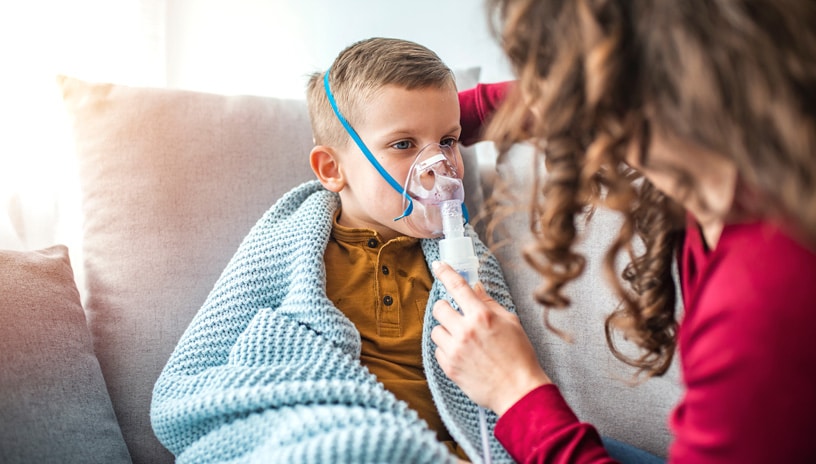Respiratory Illnesses on the Rise in Illinois

How can we help protect ourselves and our loved ones?
As 2025 begins, the Illinois Department of Public Health (IDPH) reports increased respiratory illness cases statewide. These illnesses include COVID-19, Influenza, and RSV (Respiratory Syncytial Virus).
These reports are based on statistics from emergency room visits for respiratory symptoms and hospital and intensive care unit (ICU) admissions statewide. Some central Illinois hospitals are implementing visitor restrictions to reduce the spread of infection.
Most who suffer from respiratory illness recover in one to two weeks. However, some develop serious and potentially life-threatening medical complications.
Who Is Most at Risk?
While respiratory illnesses can affect anyone, certain groups are more vulnerable, including:
- Adults over 65 years old
- Very young children
- Individuals with weakened immune systems
- Pregnant women
Proven Tools to Reduce Risk
Protecting yourself and others doesn’t require drastic measures. In fact, by committing to the following strategies, you can reduce your risk of respiratory illness.
1. Vaccinate to Prevent Severe Illness
- Vaccines remain the best defense against severe COVID-19, flu, and RSV outcomes.
- Health experts recommend COVID-19 and Influenza vaccines for everyone six months and older.
- RSV Vaccines are available for adults over 75. They are also available to pregnant women (to protect newborns), and vulnerable newborns.
It’s not too late to get vaccinated! Once a person is vaccinated, immunities build to effective levels across the following weeks and can last for months. Get your vaccine now to ensure coverage throughout the remaining cold and flu season.
2. Practice Good Hygiene
- Wash your hands frequently with soap and water for 20 seconds.
- Cover your coughs and sneezes with a tissue or your elbow.
- Avoid touching your face, especially your eyes, nose, and mouth.
Most respiratory illnesses are transmitted by respiratory droplets. Reducing exposure to items and areas that may be contaminated with the virus helps protect you from illness.
3. Enhance Indoor Air Quality
Good ventilation reduces the spread of respiratory viruses.
- During gatherings, consider opening windows.
- Use air purifiers or upgrade HVAC filters when the weather is colder.
- Maintain indoor humidity levels between 30% - 50%.
4. Avoid Exposure to Illness
Evaluate when, where, and with whom you will spend your time. Avoid exposing yourself to large crowds or individuals who are symptomatic. If you are ill or experiencing respiratory or other illness symptoms, stay home and away from others until your symptoms subside.
What Can You Do If You Get Sick?
Act quickly if you experience respiratory symptoms.
Get tested:
Early testing is key to effectively treating COVID-19 and flu. Free COVID-19 tests are available through COVIDtests.gov.
Seek Treatment:
COVID-19: Antiviral treatments like Paxlovid must begin within 5–7 days of symptoms.
Flu: Antiviral medications work best within 48 hours of symptoms appearing.
RSV: Symptoms are typically managed with over-the-counter medications, prescriptions, and medical intervention when necessary.
Early and effective treatment is especially important for high-risk individuals. Such individuals include older adults, pregnant women, and those with chronic conditions.
Most importantly, seek medical attention as soon as possible if you experience continued or worsening symptoms, especially if you are at risk for severe respiratory illness.
Accessing Vaccines and Treatments
Vaccines and treatments are widely available. Most insurance plans cover the cost of recommended vaccines. Visit Vaccines.gov to find vaccination locations near you.
If you are uninsured or your insurance does not cover vaccines, assistance with vaccine costs may be available. Check out the IDPH’s Vaccine Locator Dashboard. You can also contact your local health department or your primary healthcare provider.
Start the New Year Safe and Healthy
These preventive measures can help protect you, your loved ones, and our communities.
Visit the Moultrie County Health Department (MCHD) website for more information on staying healthy this winter. You can also access resources from the IDPH’s website or contact the MCHD directly for additional information on vaccines and testing.
Let’s work together to help ensure everyone has a safe and joyful new year.

